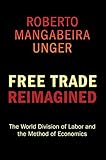Free Trade Reimagined : The World Division of Labor and the Method of Economics / Roberto Mangabeira Unger.
Material type: TextPublisher: Princeton, NJ : Princeton University Press, [2010]Copyright date: ©2007Edition: Course BookDescription: 1 online resource (240 p.)Content type:
TextPublisher: Princeton, NJ : Princeton University Press, [2010]Copyright date: ©2007Edition: Course BookDescription: 1 online resource (240 p.)Content type: - 9780691145884
- 9781400827855
- online - DeGruyter
- Issued also in print.
| Item type | Current library | Call number | URL | Status | Notes | Barcode | |
|---|---|---|---|---|---|---|---|
 eBook
eBook
|
Biblioteca "Angelicum" Pont. Univ. S.Tommaso d'Aquino Nuvola online | online - DeGruyter (Browse shelf(Opens below)) | Online access | Not for loan (Accesso limitato) | Accesso per gli utenti autorizzati / Access for authorized users | (dgr)9781400827855 |
Browsing Biblioteca "Angelicum" Pont. Univ. S.Tommaso d'Aquino shelves, Shelving location: Nuvola online Close shelf browser (Hides shelf browser)

|

|

|

|

|

|

|
||
| online - DeGruyter A Farewell to Alms : A Brief Economic History of the World / | online - DeGruyter The Next Justice : Repairing the Supreme Court Appointments Process / | online - DeGruyter The Last Freedom : Religion from the Public School to the Public Square / | online - DeGruyter Free Trade Reimagined : The World Division of Labor and the Method of Economics / | online - DeGruyter Garibaldi : Citizen of the World: A Biography / | online - DeGruyter The New Negro : Readings on Race, Representation, and African American Culture, 1892-1938 / | online - DeGruyter The Faces of Terrorism : Social and Psychological Dimensions / |
Frontmatter -- Contents -- Themes and Scope of this Book -- Chapter 1. Troubles: The Enigmas of Free Trade -- Chapter 2. Troubles: The Incompleteness of Comparative Advantage -- Chapter 3. Ideas -- Chapter 4. Theses -- Chapter 5. Proposals -- The Troubles of Free Trade and the Possibilities of Economics -- Name Index -- Subject Index
restricted access online access with authorization star
http://purl.org/coar/access_right/c_16ec
Free Trade Reimagined begins with a sustained criticism of the heart of the emerging world economy, the theory and practice of free trade. Roberto Mangabeira Unger does not, however, defend protectionism against free trade. Instead, he attacks and revises the terms on which the traditional debate between free traders and protectionists has been joined. Unger's intervention in this major contemporary debate serves as a point of departure for a proposal to rethink the basic ideas with which we explain economic activity. He suggests, by example as well as by theory, a way of understanding contemporary economies that is both more realistic and more revealing of hidden possibilities for transformation than are the established forms of economics. One message of the book is that we need not choose between accepting and rejecting globalization; we can have a different globalization. Traditional free trade doctrine rests on shaky empirical and theoretical ground. Unger takes a new approach to show when international trade is likely to be useful or harmful to the socially inclusive economic growth that every nation wants. Another message is that the movement of people and ideas is more important than the movement of things and money, and that freedom to change the institutions defining a market economy is just as important as freedom to exchange goods on the basis of those institutions. Free Trade Reimagined ranges broadly within and outside economics. Presenting technical issues in plain language, it appeals to the general reader. It puts a disciplined imagination in the service of rebellion against the dictatorship of no alternatives that characterizes life and thought today.
Issued also in print.
Mode of access: Internet via World Wide Web.
In English.
Description based on online resource; title from PDF title page (publisher's Web site, viewed 30. Aug 2021)


